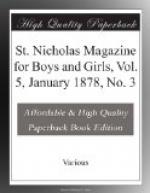Everybody knows something of the great island, Australia, the largest in the world, reckoned by some geographers as the fifth continent. I might almost have said its age is less than one-quarter of a century, instead of three. It was visited by the great adventurer, William Dampier, about the year 1690, and again, eighty years after, by Cook, on his first voyage around the world. It is only within the present generation that we have come to know it well. England’s penal colony there, and Cook’s stories of the marvelous beauty and fertility of the land, were never wholly forgotten; but almost nothing was done in the way of exploration, especially of the interior, and the world remained ignorant of both its extent and its resources until 1860, in August of which year two brave-hearted young men, by name Burke and Wills, determined to find out all that they could of the unknown central regions. It is in memory of these men that Australia’s first monument has been erected. Let me tell you their story.
Burke was in the prime of life, a strong, brave man, who delighted in daring and even dangerous exploits. Wills, an astronomer, was younger, and not so ardent, but prudent, wise, sagacious, and thus well fitted to be the companion of the adventurous Burke. Their object was to trace a course from south to north of Australia, and explore the interior, where hitherto no European had set foot.
Fifteen hardy adventurers were induced to form the little company; twenty-seven camels were imported from India, for carrying the tents, provisions and implements needed upon such a journey, a fifteen-months’ supply of provisions was laid in, and large vessels were provided for holding ample stores of water, whenever the route should lie through arid regions.
Thus burdened with baggage and equipments, the explorers started out. Their progress was necessarily slow, but the greatest difficulty with which the leaders had to contend was a spirit of envy and discontent among their followers. This led to an entire change in Burke’s plans, and perhaps also to the sad catastrophe which ended them.
Instead of keeping his men together, as at first intended, he divided the company into three squads. Assigning the command of two of these to Lieutenants Wright and Brahe, and leaving them behind at an early stage of the journey, together with most of the baggage and provisions, Burke took Wills, with two others of the most resolute of his company, and pushed boldly forward, determined to reach the northern coast if possible, but, at any rate, not to return unless the want of water and provisions should compel him.




